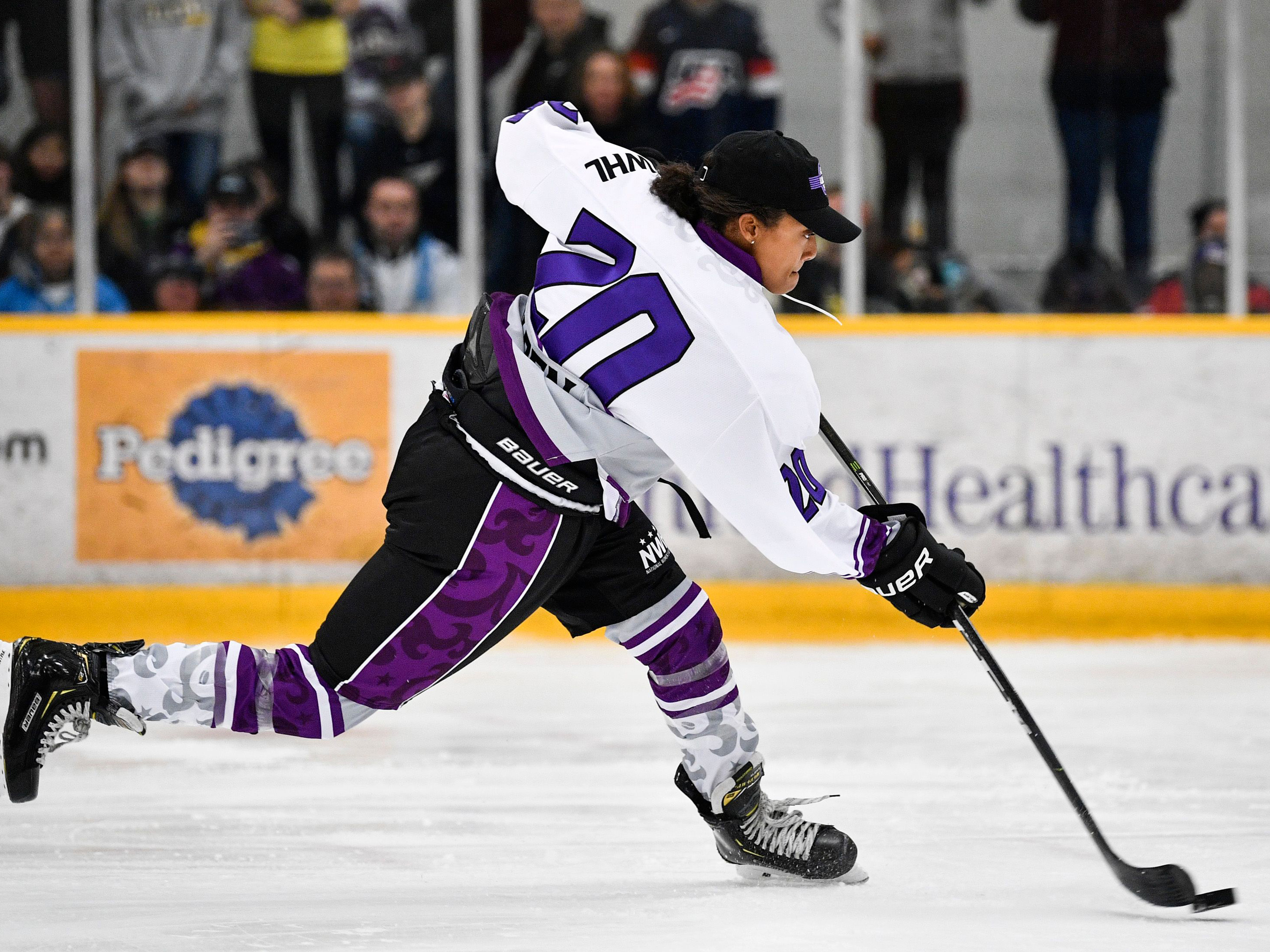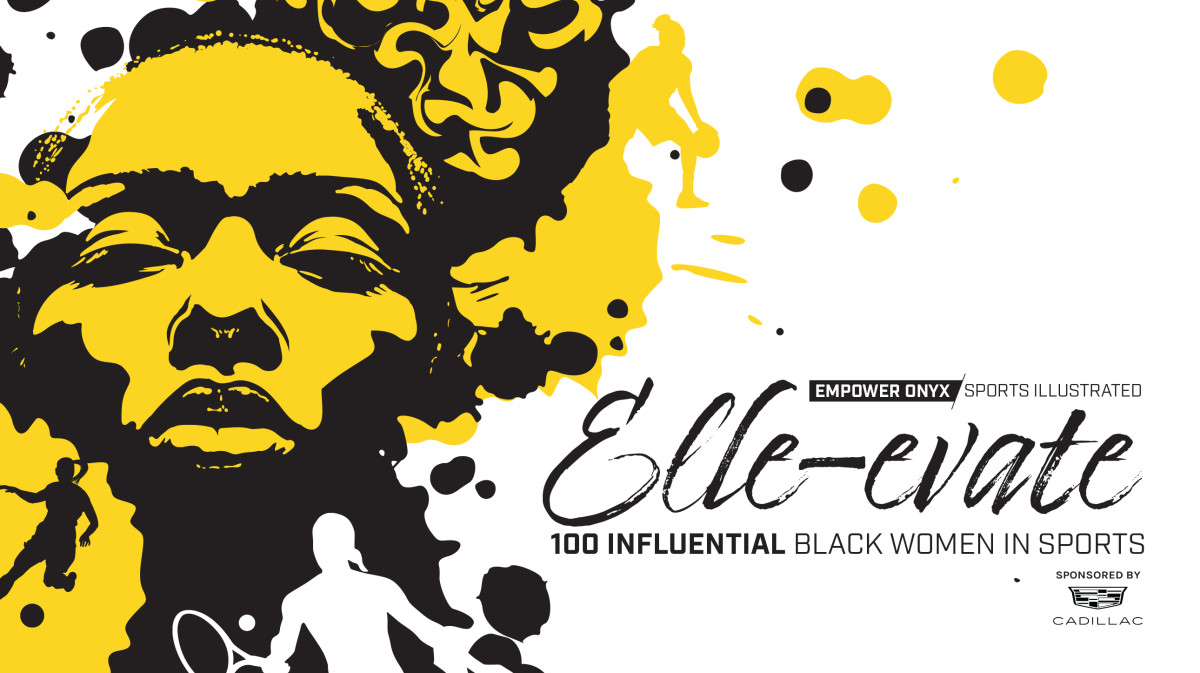Blake Bolden Continues to Break the Ice
Sports Illustrated and Empower Onyx are putting the spotlight on the diverse journeys of Black women across sports—from the veteran athletes, to up-and-coming stars, coaches, executives and more—in the series, Elle-evate: 100 Influential Black Women in Sports.
Blake Bolden has achieved a lot of “firsts” in her career. But many of them almost didn’t happen.
Just 30 years old, Bolden has broken into the predominantly white sport of hockey in a way never done before: She was first Black player drafted in the first round of the CWHL, the first Black woman to compete in the NWHL and the first Black woman to scout in the NHL.
But when she was cut from the U.S. women’s national team and the Olympic squad after college, she contemplated quitting hockey altogether. “Someone told me, ‘Blake, you can't quit. You're still one of the best players in the world,’ ” Bolden recalls.

A hockey rink was once one of the rarest places to see people of color. Bolden—who was introduced to the game when she was in elementary school by her mother’s boyfriend, Leslie—is shifting that dynamic. Bolden had no idea what hockey was until Leslie started taking her to games; he was a police officer who worked part-time security at the Gund Arena for Cleveland Lumberjacks games. “It was like going to an amusement park,” says Bolden, who got to run around in the locker rooms and meet the players. “It was so exciting to see them saunter by me, strong and powerful. I became friends with some of them and they came to my birthday parties.”
It wasn’t long before Bolden was asking to play. “One day we were driving home, and I asked ‘How do we do that? How do I get the equipment?’ And his eyes lit up as he said, ‘Oh yeah, we're going to do this. We’re going to figure out a way.’ ” Within 48 hours they found secondhand equipment and a rink for her to play at. “I had never skated before I got the equipment. I got on the ice, and was just thrown out there like, ‘Sink or swim kid.’ And I chose to swim.”
Bolden, who is now a scout for the Los Angeles Kings, is cognizant of how inspiring it is to see someone who looks like you in the position of your dreams. “I never saw a professional women's ice hockey league or a Black woman playing at all,” says Bolden, who played another person of color for the first time when she was a senior at Boston College. “So it meant the world to me to be the first Black woman to play professionally in the NWHL.”
When she thought about stepping away from hockey, she was pulled back in by the voices of the young Black girls who told her they started playing the sport, going to games and learning what hockey was because of her. “That is probably the ‘first’ that I’m most proud of because of the impact and the growth that I saw in our game. And [the game] kind of saved me as well.”
Now kids within Bolden’s reach don’t have to stumble upon the sport or figure out ways to get to it. In addition to her scouting duties, she provides a blueprint on how to play hockey as a growth and inclusion specialist. She’s passionate about encouraging kids from all backgrounds to play professionally, and hopes that it can somehow enhance their lives like it did hers. “Hockey has changed my life because it's smacked me in the face a lot, physically, emotionally and mentally,” Bolden says. “And it's forced me to have to get back up. The game changed my life and my trajectory forever.”
The challenges forced her to be resilient. There were many times when Bolden was the only Black person at the rink, and she lost herself by feeling the need to conform. However, she regained her confidence and self-identity through the game and through the support of her family.
“When I was trying out for teams at a young age and I was the only girl and the only person of color on the team, the pushback happened, and I had to learn how to deal with that without it affecting me mentally and without affecting how I performed on the ice,” Bolden says. “I stayed focused and driven on the task at hand, because I've been conditioned to understand how to handle it and understand how to be my best self and move forward.”

Bolden’s family, especially her mother, has always been her rock during hard times. “[My mom] had to tell me that the words that were said at times had nothing to do with me and my worth and value,” says Bolden, who describes herself as a very kind, gentle person by nature, but sets that aside when she “locks the cage” on the ice. Her mom told her that ignorance and a lack of love and courage led to those comments. “I believed and trusted her. I felt protected when I was with her walking into the rink. I felt like I had a shield when I was with my family going into the rink.”
Bolden’s mentors in the league have also supported and encouraged her from the start; she lists NHL senior executive vice president Kim Davis, the Kings’ president Luc Robitaile, director of player and personnel Nelson Emerson and vice president of community relations and team services Jen Pope, among others, as a guiding force. Bolden, along with Pope, is growing hockey inclusively in Southern California with a goal to diversify the sport in the region.
Being a Black woman, especially in the corporate world, requires strength and balance. Bolden often hears the condescending voices other women are all too familiar with: You have to be strong, but you can't be too strong. You have to be smart, but you can't be too smart. “I learned at a young age that I had to figure out how to be me and still be strong and powerful and ask for help when I needed it, which I think is very important,” Bolden says. “And, luckily I've just ran across some really great people [who are helping me along the way].”

Bryna Jean-Marie is a contributor for Empower Onyx, a diverse multichannel platform celebrating the stories and transformative power of sports for Black women and girls.
